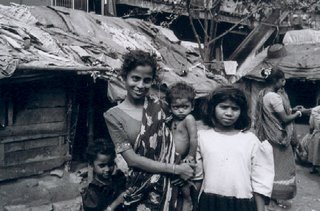
...but I am not anti reservation either.
I would like to start this post with some facts and figures:
Total population of India: 1,028,610,328
SC/ST Population: 250,961,940 (~25%)
OBC Population: No definitive number, assumed to be around 52%
Percentage of Upper Caste: ~22%
The Consitution of India bars reservation beyond 50%.
I have been pretty unconcerned (read cold) toward this reservation issue but there was a big debate at work yesterday and every one was throwing up numbers in the air. So I went back and tried gathering as much information on the net before I had anything further to say. My sources include the Census of India, newspapers and some reports I found on the matters, a few of which also talk about the Mandal Commission. I know its really sad to know that more than 75% of the population of India is considered backward but lets move on...
Part I - On Social Justice:
Firstly who constitues the Other Backward classes?
The Mandal commission proposed 3 categories to identify the OBCs depending on social, economic and educational backwardness. A detailed description is given in Identifying OBCs.
I am not very convinced about the different parameters used to evalute whether a particular group belongs to the OBC or not, but it definitely talks about sections of society that are deprived.
India still remains a nation of extremely poor people. The central estimate is pegged around
 40% but I belive it is somewhere in the range of 55-60%. I know, it hurts to accept the fact that more than 60 years after independence, majority of the population is still living in such a pitiable situation. More so because of the callousness of people who are affluent and can bring in change. But this post is not intended towards the social indifference in the Indian society.
40% but I belive it is somewhere in the range of 55-60%. I know, it hurts to accept the fact that more than 60 years after independence, majority of the population is still living in such a pitiable situation. More so because of the callousness of people who are affluent and can bring in change. But this post is not intended towards the social indifference in the Indian society.Hence most of the people who would get affected by the reservation are people who belong to the upper/middle caste. The middle cast constitutes about 7% of the Indian population. Of the upper class 10% have so much money that they do not really care about the reservation issue, they can always send their kids aboard for studies if they WANT to. So doing some simple arithmetic the fraction of the population that is getting affected in an adverse manner if at all is about 12%.
Another EXTREMELY important aspect of governance. Goverments are not run like corporates and thankfully so. They have to keep the benefit of the masses in mind !!
So of the goverment thats affects 50% of the population in a positive manner at least makes social sense. I know there are other ways of improving the situation, like good primary education, vocational education, micro-finance initiatives but all this would take time and effort and initiatives are already on their way in these directions too. But coming back to question of reservation, if this reservation helps someone get education and a job later, his entire family transforms. The turn around time is much less in this scenario.
Part II - On Education
Now lets talk about meritocracy, and let me tell you all this talk about meritocracy is pure balony and nothing else. The only places in India that where one can get good educations are the top tier colleges like the IITs, AIIMS, BITS, a couple of others and of course DU. But once you move away from the these colleges, the quality of education decreases exponentially. All education means in India is just getting a degree. I have hardly come across anyone who really learnt something during their college days and yeah I HAVE interacted with a lot of people. The second/third tier colleges are dime a dozen and many more would mushroom if there is a demand for them, so the students going there should not be really alarmed.
Now coming back to the premier institutes. They still have 50% seats thats are based on Merit. The very best will still get in, and if you really care about meritocracy thats all you want. People getting into these insitutes would be more focused and determined about their goals in life because the competition is so much tougher. People wont just land up in IIT because thats what everyone around them aspires to do. Then and only then would we have good Engineers/Doctors in the true sense of the word. And even if 20% of these students were really good, thats all it would take to change the country. Sadly thats not the case (maybe another post on that sometime...). So as far as retaining the best talent is concerened this "current" system of reservation does nothing to hinder the growth of true merit. People with true caliber would still go places in this scenario.
Now lets consider someone who belongs to the general category and was just on the border and would get rejected because of this act. He does have an option, an option to work harder and make it to the insitute. And is working hard bad? A developing country like India needs people who work really hard!!!
After my little research I feel various organizations like Youth for Equality are fighting a non-issue. They should have fought when the standards of IIT-JEE were smashed, they should have revolted when the number of IITs were being increased. India does not have enuf Profs to teach in the existing IITs where will they get profs for 11 more IITs. These are things that would have really taken down the name of IIT but we didn't hear even a whimper of protest. Did these people take up to the roads when they discovered the sorry state of affairs in primary education, or Narmada Dam issue for that matter. There are so many more important issues that need addressing, but alas their selfish motive is blind to them.
The reservation helps a major section of the society in a positive way and makes things a little harder for a smaller section. I really do not see how that is a cause for such uproar until all those protesting want is things made easier for them, easier for them to get into colleges to get jobs. India at this juncture can ill affoard these luxuries. And they talk about MERITOCRACY !!!! I am amused...
Part III - On Autonomy of Educational Insitutes
The only reason that concerns me about this reservation issue is the ease by which the Legislature can affect the course of education in this country. It is not reservation but the power of the Legislature to govern and change the functioning of colleges is what irks me. And this is not something that should be allowed in a Knowlege based society. US is what it is today because of private universities, that have complete autonomy in their governance. Sadly in India all these good colleges are goverment funded, and whereever thats the case the funding agency decides the course of research and teaching in the country. This flaws plagues not only India but a lot of European countries like Germany. They used to produce the BEST engineer till about the 40's but now they are reduced to second rate counterparts of the US univs. I hope people with capital (the big corporates, alumni of the premier institutes) realise this flaw in the educational system and take steps to change it before its too late. These should be private insitutes of the stature of MIT, Standford and Yale.
And after all the deliberations I think it makes sense to have some kind of reservation. What kind and what percentage I am not knowledgeable enough to comment.
At the end: I DO NOT approve of students getting beaten up during the demonstrations but at the same time I do not approve of students taking to streets for solving their problems. What then is the difference between people who attend Laloo's rally and the ones who attend the Maha Rally of the medicos/engineers. I believe it is just cheap mindless theatrics in a fit of josh.
There could have been more ways of solving the problems of poverty, of backwardness. This is one way and the numbers show that if implmented in a correct manner they would indeed affect the society positively. If not you better come up with an action plan before you curse the goverment for their deeds.
What is the current goverment's motive behind the reservation, and would they be able to implement it in a fair way? I don't know.
Jai Hind
References:
Census of India
Positive Discrimination in India: A Political Analysis
Identifying OBCs







